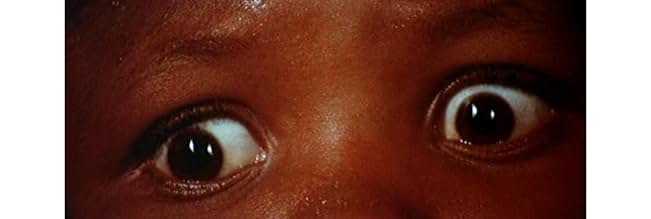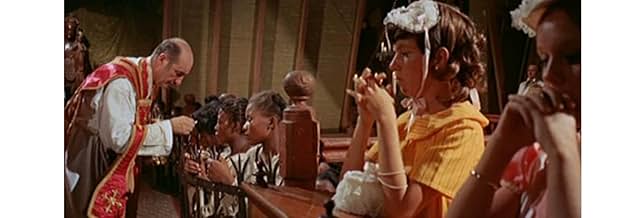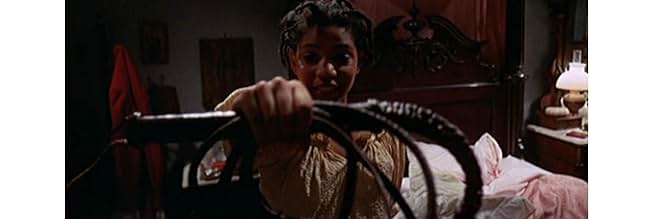CALIFICACIÓN DE IMDb
6.5/10
2 k
TU CALIFICACIÓN
Dos realizadores de documentales retroceden en el tiempo hasta el sur de los Estados Unidos antes de la Guerra Civil para filmar la trata de esclavos.Dos realizadores de documentales retroceden en el tiempo hasta el sur de los Estados Unidos antes de la Guerra Civil para filmar la trata de esclavos.Dos realizadores de documentales retroceden en el tiempo hasta el sur de los Estados Unidos antes de la Guerra Civil para filmar la trata de esclavos.
- Dirección
- Guionistas
- Elenco
Dick Gregory
- Self
- (sin créditos)
Gualtiero Jacopetti
- Self
- (sin créditos)
Ernest Kubler
- Whip
- (sin créditos)
Yayoi Kusama
- Self
- (sin créditos)
Franco Prosperi
- Self
- (sin créditos)
Shelley Spurlock
- Girl
- (sin créditos)
- Dirección
- Guionistas
- Todo el elenco y el equipo
- Producción, taquilla y más en IMDbPro
Opiniones destacadas
I viewed this particular film in the summer of 1972 in New York City. I remember that it was opening day and the turnout was surprisingly large. The other thing that I remembered was that I thought the filmmakers had taken an original approach as far as their documentary-style on slavery. As if I were actually there, watching the events take place. As an African-American man, I found the film fascinating and enlightening. The only thing I did find questionable was, once again, the Black man was depicted as a sexual beast with over-sized reproductive organs. I do believe that this, to some, is what made the movie so titillating. Overall, I still had a pleasant movie going experience. I would like to ask any readers of this commentary that if they have any knowledge of how I may a obtain a copy of this film to please contact me through my e-mail.
Goodbye Uncle Tom is a downright jaw-dropping and surprisingly professional production in the Mondo Cane series. Terrifically shot documentary-style, this film explores the interaction between the races in modern America. Slavery, Black Rage, White Oppression...Jacopetti and Prosperi are all showing it uncensored and without mercy. It's repulsive, shocking and the violence subtly get more under your skin as opposed to the average teenage horror slasher. The inhumanity of previous generations makes you bow your head in shame. Guided by a thrilling Riz Ortolani score (perhaps known best for his Cannibal Holocaust music) Goodbye Uncle Tom shows how black people are being exploited, raped and killed for no reason other than being "inferior". The films opens with a truly atmospheric portrait of how Martin Luther King's death mobilized the black community. Right from that moment, you just know that you're about to see a film that is a lot more intelligent than it seems and ahead of its time when it comes to being provocative. A history lesson that sticks to you! Of course, because of its realism, it cannot be recommended to everyone. Goodbye Uncle Tom is better not watched by the faint-hearted. Highly recommended piece of revolutionary cinema!
Many people who have claimed to see this film have not. Most of those who have seen it, have not understood. GOODBYE UNCLE TOM was directed by Gualtiero Jacopetti & Franco E. Prosperi, the two men who pioneered the documentary movement that came to be known as the "Mondo" film, a term the two dislike immensely. Hot on the heels of their controversial and still-relevant AFRICA ADDIO, it was meant to exonerate them from accusations of racism. Ironically, it would do the exact opposite. It was developed as an idea to adapt the novel "Mandingo" as an historical, documentary style drama. What emerged was a shocking, difficult-to-watch-at-times, treatise on the horrors of slavery, and the source of racism in America, if not the world, today. It was the filmmakers' intention not to pander to a politically correct theory that slaves of the 1840's had a 1970's awareness of their situation. The events are all historically correct. Many of the characters are people who actually lived. The dialogue is verbatim from true manuscripts of the day. The racism is a genuine depiction of plantation life of the day. It was felt that glossing over the African experience in America would be an insult to the pain and suffering of the millions who survived the "middle passage' only to welcome a life a slavery, no different from an animal or piece of property.
Years after it's initial release, the directors have expressed a regret at not opening the film with an explanation stating that this was a film about the emotions of that bygone era, not of the filmmakers themselves.
The controversial final scenes, which take place in contemporary America, are based on "The Confessions of Nat Turner", and are meant to represent an angry, reactionary vengeance on behalf of the millions, with whom the character identifies. Malice for sure, but not unmerited malice. This film should cause strong emotions. Any film that tackles a moral issue must cause debate and conjecture if it is to succeed. What makes the film even more extraordinary is that it succeeds without claiming a moral superiority, or taking a moral stance. What appears on screen are the most graphic, realistic depictions of the North American slave trade of the 19th century, and this film should be required viewing in Black History classes on college campuses, and high schools all over the world, particularly in America. This film preceded ROOTS by six years and stands as a much harsher indictment of the evils of human bondage. This is one of the bravest works of cinema and remains a misunderstood humanitarian masterpiece.
Years after it's initial release, the directors have expressed a regret at not opening the film with an explanation stating that this was a film about the emotions of that bygone era, not of the filmmakers themselves.
The controversial final scenes, which take place in contemporary America, are based on "The Confessions of Nat Turner", and are meant to represent an angry, reactionary vengeance on behalf of the millions, with whom the character identifies. Malice for sure, but not unmerited malice. This film should cause strong emotions. Any film that tackles a moral issue must cause debate and conjecture if it is to succeed. What makes the film even more extraordinary is that it succeeds without claiming a moral superiority, or taking a moral stance. What appears on screen are the most graphic, realistic depictions of the North American slave trade of the 19th century, and this film should be required viewing in Black History classes on college campuses, and high schools all over the world, particularly in America. This film preceded ROOTS by six years and stands as a much harsher indictment of the evils of human bondage. This is one of the bravest works of cinema and remains a misunderstood humanitarian masterpiece.
I've seen a lot of offensive films in my time, from Cannibal Holocaust to A Siberian Film, but this one is easily the most tasteless, offensive, unpleasant films I have ever seen. Yet somehow it is also riveting, like watching a car crash unfold in slow motion. Several times I was on the verge of turning it off in sheer disgust, but found myself holding off, just to see how much more depraved it could get.
The "plot", such as it is, concerns a pair of time-travelling reporters from Italy going back to the south of the USA during the heyday of slavery, to conduct a "inquest" into slavery. Presenting itself as a condemnation of slavery, it instead revels in the unpleasantness, delivering atrocity upon atrocity with a smirk on it's face. The horror inflicted on the slaves in Django Unchained pales in comparison to the never-ending parade of unpleasantries served up here. I suppose it does present a view of what slaves went through at the time, but it's hard to feel that they are condemning the acts when all the slaves are presented as little more than dumb animals.
Amongst the dubious "delights" on offer are rape, castration, paedophilia and the truly horrible scene where the poor reporter is "seduced" by a 13 year old black prostitute. It's made so much worse as everything is presented as though we are seeing it through their eyes.
It's certainly unforgettable, and if you're not easily offended or squeamish, it's worth watching once, even if it's just to see how low Italian exploitation cinema managed to stoop. You might need a good shower afterwards, however.
Rating: 7/10 just for the sheer gall of the film.
The "plot", such as it is, concerns a pair of time-travelling reporters from Italy going back to the south of the USA during the heyday of slavery, to conduct a "inquest" into slavery. Presenting itself as a condemnation of slavery, it instead revels in the unpleasantness, delivering atrocity upon atrocity with a smirk on it's face. The horror inflicted on the slaves in Django Unchained pales in comparison to the never-ending parade of unpleasantries served up here. I suppose it does present a view of what slaves went through at the time, but it's hard to feel that they are condemning the acts when all the slaves are presented as little more than dumb animals.
Amongst the dubious "delights" on offer are rape, castration, paedophilia and the truly horrible scene where the poor reporter is "seduced" by a 13 year old black prostitute. It's made so much worse as everything is presented as though we are seeing it through their eyes.
It's certainly unforgettable, and if you're not easily offended or squeamish, it's worth watching once, even if it's just to see how low Italian exploitation cinema managed to stoop. You might need a good shower afterwards, however.
Rating: 7/10 just for the sheer gall of the film.
Anyone thinking of checking this film out: be warned, words can not express what an awesomely brutal experience it is to sit through. I'm a big fan of horror films, but nothing I ever saw came close to the feeling of revulsion this 30 plus year old film gave me. Trust me, you will have to use the fast forward button on your remote control several times sitting through this one.
A group of Italian journalists goes back in time to America during the time of slavery and documents what they see. The viewer is spared no amount of detail as we are shown what it was like to travel aboard a slave ship, be sold in market as common livestock, be raped, tortured hunted and killed, and basically denied even the slightest bit of human empathy or compassion at every turn.
While Roots covered the same subject matter a whole lot better, it came nowhere near delivering the visceral reaction of this film. For that reason, I recommend people watch Goodbye Uncle Tom. While by no means a great film, if society is truly never to forget the injustices and wrongs of the past, work like this is necessary viewing.
A group of Italian journalists goes back in time to America during the time of slavery and documents what they see. The viewer is spared no amount of detail as we are shown what it was like to travel aboard a slave ship, be sold in market as common livestock, be raped, tortured hunted and killed, and basically denied even the slightest bit of human empathy or compassion at every turn.
While Roots covered the same subject matter a whole lot better, it came nowhere near delivering the visceral reaction of this film. For that reason, I recommend people watch Goodbye Uncle Tom. While by no means a great film, if society is truly never to forget the injustices and wrongs of the past, work like this is necessary viewing.
¿Sabías que…?
- TriviaThe movie was originally released in Italy in a 119-minute version and immediately withdrawn when the directors were sued for plagiarism by writer Joseph Chamberlain Furnas. It was re-released in March 1972 in a re-cut 136-minute version under the title 'Zio Tom.'
- Créditos curiosos'Questo film è un documentario. I fatti sono storicamente avvenuti ed i personaggi sono realmente esistiti.' Which translates to: 'This film is a documentary. The facts historically happened and the persons really existed.'
- Versiones alternativasBefore receiving a UK cinema certificate in 1973 the film was extensively cut by around 30 minutes by the BBFC with heavy edits to rape scenes, footage of sexual experiments, graphic violence, the fantasy murder sequence, and the opening scenes on the slave ship.
- ConexionesFeatured in Adam & Yves (1974)
Selecciones populares
Inicia sesión para calificar y agrega a la lista de videos para obtener recomendaciones personalizadas
- How long is Goodbye Uncle Tom?Con tecnología de Alexa
Detalles
- Fecha de lanzamiento
- País de origen
- Idiomas
- También se conoce como
- Goodbye Uncle Tom
- Locaciones de filmación
- Port-au-Prince, Haiti(Majority of interiors and exteriors)
- Productora
- Ver más créditos de la compañía en IMDbPro
Contribuir a esta página
Sugiere una edición o agrega el contenido que falta

Principales brechas de datos
What is the Spanish language plot outline for Adiós tío Tom (1971)?
Responda





















